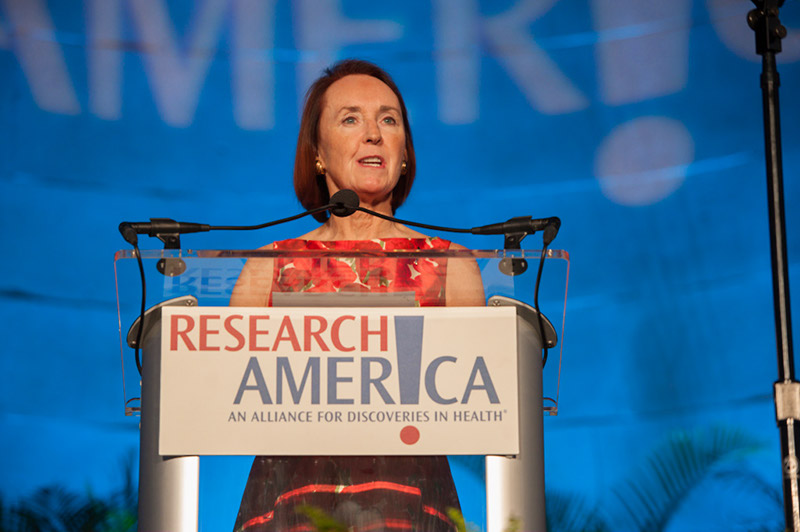What Does $10.6 Billion Buy?

Halloween spending is projected to hit a record high of $10.6 billion this year, exceeding pre-pandemic levels. It’s great to see people so eager to celebrate! It’s also an opportunity to put research spending into perspective: $10.6 billion is more than the NIH research budget this year for mental health, heart disease, diabetes, obesity, opioid misuse and addiction, kidney disease, antimicrobial resistance, and stroke combined.
To look at it another way, $10.6 billion is equal to the combined FY22 budgets of CDC, ARPA-H, AHRQ, and Biomedical Advanced Research and Development Authority. (Read more comparisons that lend perspective to federal research and public health spending. Concerns raised about what is, to most of us, big spending, can be put in a ‘compared-to-what?’ context.)
Connect With Your Representatives: As I mentioned last week, the next few Weekly Letters will feature various ways to advocate for medical progress in anticipation of Congress’ return to the Hill next month. We’re keeping two key objectives in mind: 1) ensure an FY23 appropriations package passes Congress and is signed into law before December 16; and 2) secure in that package robust increases for NIH, FDA, CDC, NSF, and AHRQ.
This Week’s Suggestion: As Abraham Lincoln famously said, “Public sentiment is everything. With it, nothing can fail; against it, nothing can succeed.” Some of the most public forums live in the ‘fourth estate’ of the media. Writing a letter to the editor (LTE) in response to a recent article is an effective way to make your voice heard, add value, and create public dialogue.
There is almost always an article in the news cycle – local or national, print or online – to which you can respond to champion your reasons for supporting faster medical and public health progress. Use our 101 guide for writing and submitting LTEs to help ensure your voice is heard.
Pandemic Preparedness: Speaking of letters, this morning we sent one to Senate leaders urging them to spearhead bipartisan, bicameral passage of the PREVENT Pandemics Act (S. 3799) as an urgent national priority. This important, bipartisan bill passed the Senate HELP Committee, then stalled. Use this editable email to urge your representatives in Congress to champion passage of S.3799. By urging action, you can help ensure our nation (in partnership with the global community) remains in front, rather than at the mercy, of the next catastrophic public health threat.
Learning From the Microgrant Program: Since 2018, Research!America’s Microgrant Program, supported by the Rita Allen Foundation, has awarded grants to groups of STEM graduate students and postdoctoral researchers from across the country to support civic engagement projects of their design. A new report explores how the program has impacted the early career scientists involved. Yesterday, we presented findings from the report to a group of leaders across the civic science community.
Through surveys and interviews, Microgrant participants reported learning a valuable range of new skills, appreciating the opportunity for career exploration, and much more. I hope you’ll take a few minutes to review the report – early career scientists can definitely teach those of us who have been at this a long time a thing or two about creativity, connecting, and succeeding in policy engagement and community outreach!
Special Issue of Nature: Last week’s issue of Nature is devoted to addressing racism in science. The quartet of guest editors shares their “message in a bottle,” in which they urge the science community to apply the value science places on self-correction in the pursuit of truth to acknowledge and overcome long-standing practices that have too often ignored contributions from non-white scientists.
The smart and right path forward includes actively Incorporating diversity, equity, inclusion, and accessibility into the evolution of science. Common sense tells us that a diversity of experiences and perspectives will increase the “shots on goal” against the challenges science confronts as it serves the public’s interest. Justice tells us that prejudice and its manifestations have no place in modern (or any) society.
ICYMI: Today we were joined by Dylan George, PhD, Director of Operations for the Center for Forecasting and Outbreak Analytics (CFA) at the CDC. Dr. George provided a compelling overview of how the data-driven and collaborative work that has already come out of CFA in its first year helps us better predict and navigate current and future infectious disease threats. Watch the recording.
Upcoming Alliance Discussion: Join us Wednesday, November 2, at 1:30 p.m. ET for a conversation with Adam Felsenfeld, PhD, Program Director for the Division of Genome Sciences at the National Human Genome Research Institute. Dr. Felsenfeld will speak to us about the current work of the Human Genome Reference Program.




